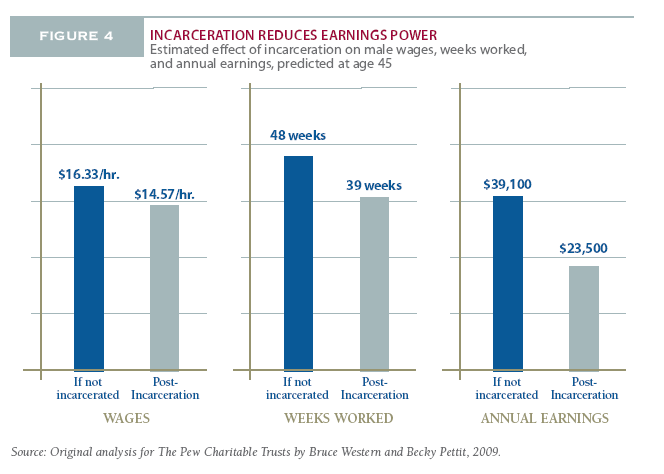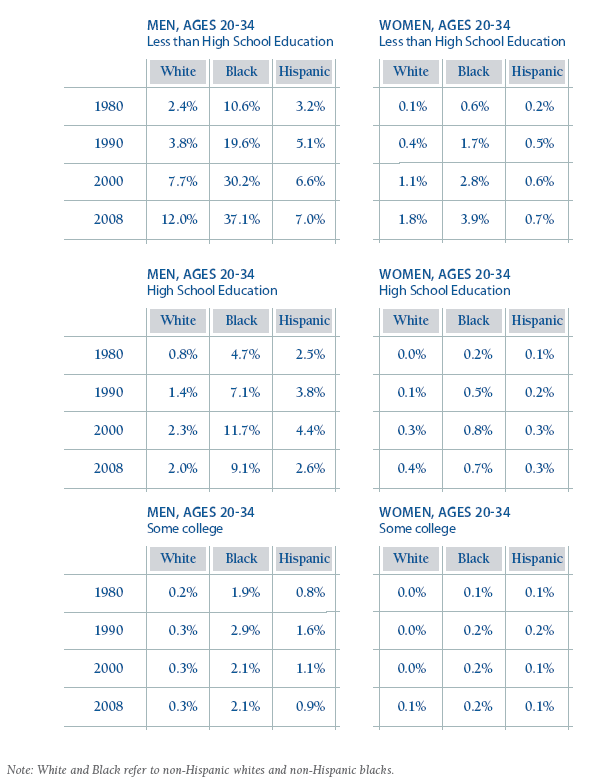Prison Makes Prisoners and their Children Poorer…
A new report was released yesterday by the Pew Center on the States.
Collateral Costs: Incarceration’s Effect on Economic Mobility, based on research by Harvard University professor Bruce Western and University of Washington professor Becky Pettit, documents the devastating impact of prison not just on the economic prospects of inmates, but also on those of their children.
I would sum up the report this way: Prison makes prisoners and their children poorer and we should therefore avoid throwing people into prisons. This is incredibly simplistic of course. The full report is worth reading. Here are some of its key conclusions.
Collateral Costs finds that “incarceration reduces former inmates’ earnings by 40 percent and limits their future economic mobility.”
Collateral Costs details the concentration of incarceration among men, the young, the uneducated and African Americans. One in 87 working-aged white men is in prison or jail compared with 1 in 36 Hispanic men and 1 in 12 African American men. Today, more African American men aged 20 to 34 without a high school diploma or GED are behind bars (37 percent) than are employed (26 percent). Education greatly reduces ones chance of ending up in prison.
The report authored by Pew’s Economic Policy Group and the Pew Center on the States shows that:
• Before being incarcerated, two-thirds of male inmates were employed and more than half were the primary source of financial support for their children.
• After release, former male inmates work nine fewer weeks annually and take home 40 percent less in annual earnings, making $23,500 instead of $39,100. That amounts to an expected earnings loss of nearly $179,000 through age 48 for men who have been incarcerated.
• Of former inmates who were in the bottom of the earnings distribution in 1986, two-thirds remained there in 2006, twice the number of non-incarcerated men.
“Pew’s past research shows a variety of factors influence economic mobility both within a person’s lifetime and across generations. This report finds that incarceration is a powerful determinant of mobility for both former inmates and their children,” said Erin Currier, project manager of the Economic Mobility Project of Pew’s Economic Policy Group.
The report also shows more than 2.7 million minor children now have a parent behind bars, or 1 in every 28 (this adds up to 3.6% of all children). For African American children the number is 1 in 9, a rate that has more than quadrupled in the past 25 years. Almost half of the prisoners with children lived with them prior to incarceration, and more than half of the parents who ended up in prison were the primary earners in their family. From the report:
One study examined the financial well-being of children before, during and soon after the incarceration of a father. It found that in the period that the father was behind bars, the average child’s family income fell 22 percent compared with that of the year preceding the father’s incarceration. Family income rebounded somewhat in the year after release, but was still 15 percent lower than in the year before incarceration.
Data from the Economic Mobility Project show that parental income is one of the strongest indicators of one’s own chances for upward economic mobility. Forty-two percent of children who start out in the bottom fifth of the income distribution remain stuck in the bottom themselves in adulthood. Having parents at the bottom of the income ladder is even more of a barrier for African Americans, 54 percent of whom remain in the bottom themselves as adults.
Research also indicates that children whose parents serve time have more difficulty in school than those who do not weather such an experience. One study found that 23 percent of children with a father who has served time in a jail or prison have been expelled or suspended from school, compared with just 4 percent of children whose fathers have not been incarcerated. Research that controls for other variables suggests that paternal incarceration, in itself, is associated with more aggressive behavior among boys and an increased likelihood of being expelled or suspended from school.
This is especially troubling given the powerful impact education has on one’s upward economic mobility in adulthood. Among those who start at the bottom of the income ladder, 45 percent remain there in adulthood if they do not have a college degree, while only 16 percent remain if they obtain a degree. And, children who start in the bottom of the income ladder quadruple their chances of making it all the way to the top if they have a college degree. As a new generation of children are touched by the incarceration of a parent, and especially as those children feel the impact of that incarceration in their family incomes and their educational success, their prospects for upward economic mobility become significantly dimmer.
Read the entire report, you will find it informative and hopefully a catalyst for more social action.


